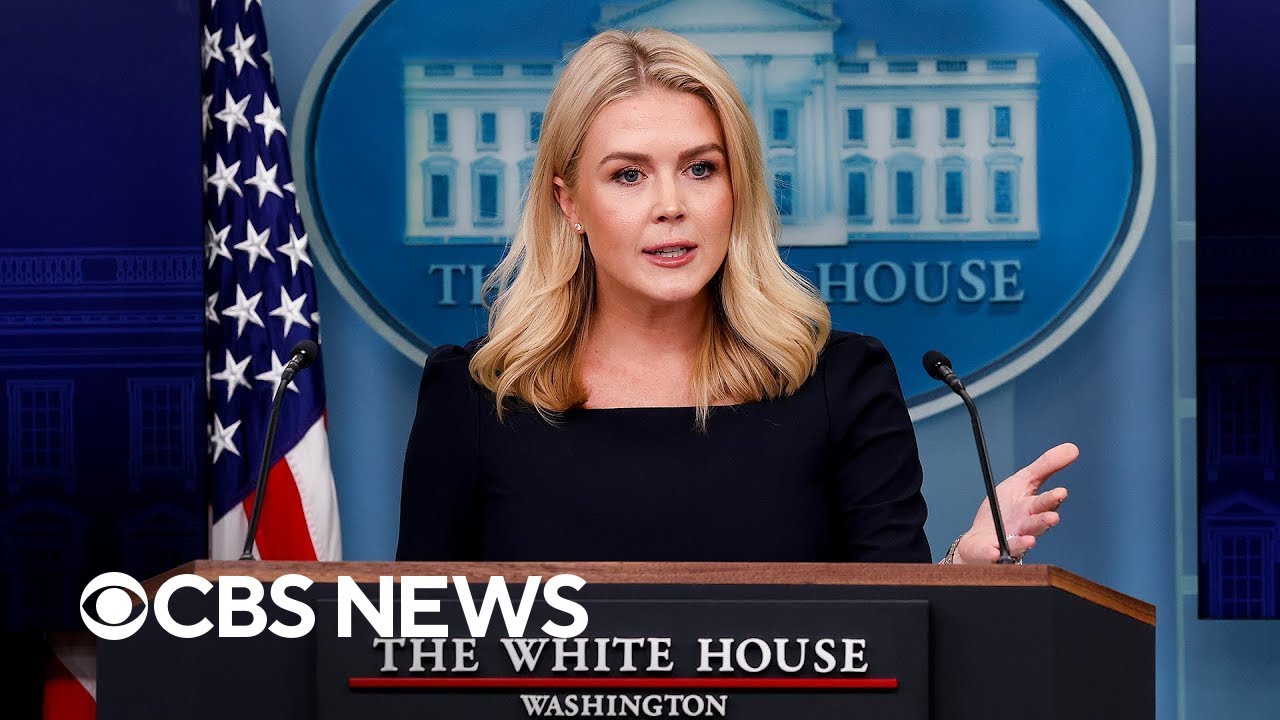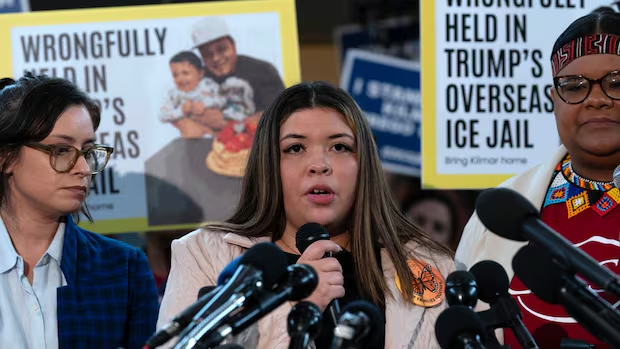The White House is grappling with a diplomatic and legal firestorm following the erroneous deportation of Kilmar Ábrego García, a Maryland resident, to El Salvador’s notorious Terrorism Confinement Center (Cecot). The controversy, spotlighted in a recent YouTube video titled “‘Garcia was a foreign terrorist…’ White House clears air on El Salvador ‘criminal’ deportation row,” has escalated tensions between the U.S. and El Salvador, raising questions about due process, international agreements, and the Trump administration’s aggressive deportation policies. As courts, lawmakers, and families demand answers, the case of Ábrego García has become a flashpoint in the broader debate over immigration enforcement.
A Costly Administrative Error
Kilmar Ábrego García, a 29-year-old Salvadoran immigrant, was deported to El Salvador on March 15, 2025, despite a 2019 court order granting him “withholding of removal” status, which protected him from being sent back to his home country due to the risk of persecution by local gangs. The U.S. government has acknowledged that his deportation was an “administrative error,” a mistake that landed him in Cecot, a maximum-security prison known for housing alleged gang members and criticized for human rights abuses. Ábrego García, who lived legally in Maryland with his U.S. citizen wife, Jennifer Vasquez Sura, and their three children, was among 238 Venezuelans and 23 Salvadorans deported under a deal between the Trump administration and El Salvador’s President Nayib Bukele.
The agreement, which involves the U.S. paying El Salvador $20,000 per deportee per year—totaling $6 million for the recent group—allows the U.S. to send alleged members of gangs like MS-13 and Tren de Aragua, designated as “foreign terrorist organizations” by the Trump administration, to Cecot. However, Ábrego García’s case has drawn scrutiny because he has no criminal record in the U.S. or El Salvador, and his alleged MS-13 affiliation is based on what U.S. District Judge Paula Xinis called “a singular unsubstantiated allegation” from a confidential informant in 2019.
White House Defends Deportation, Faces Backlash

In a White House briefing captured in the YouTube video, Press Secretary Karoline Leavitt defended the administration’s stance, claiming Ábrego García was a “verified” MS-13 member and citing his clothing—a sweatshirt with money imagery covering presidents’ faces—as a “known MS-13 gang symbol.” Leavitt’s remarks, echoed by Vice President JD Vance and other officials, have been met with skepticism. Ábrego García’s lawyers, supported by Judge Xinis, argue that the evidence against him is flimsy, pointing to his clean record and the 2019 immigration judge’s ruling that he faced persecution risks in El Salvador.
The administration’s narrative took a contentious turn during a Monday Oval Office meeting between President Donald Trump and President Bukele. When pressed about Ábrego García’s return, Bukele dismissed the idea, saying, “How can I return him to the United States? I smuggle him into the United States or what do I do? Of course, I’m not going to do it.” He referred to Ábrego García as a “terrorist,” aligning with the Trump administration’s rhetoric. Trump, nodding in agreement, criticized reporters for advocating for “a criminal released into our country” and expressed enthusiasm for deporting “as many as possible” to El Salvador, even floating the idea of sending U.S. citizen criminals to foreign prisons if legally permissible.
Legal Battles and Court Orders
The case has sparked a high-stakes legal battle. On April 4, Judge Xinis ordered the Trump administration to return Ábrego García to the U.S. by April 7, calling his deportation “an illegal act” and warning of contempt if the government failed to comply. The Supreme Court, in a unanimous ruling on April 10, upheld Xinis’s order, directing the administration to “facilitate” Ábrego García’s return while respecting executive authority in foreign affairs. However, the administration has argued it lacks the power to extract him from El Salvador’s custody, citing Bukele’s refusal and the limits of U.S. jurisdiction.
In a Tuesday hearing, Xinis demanded daily updates on efforts to bring Ábrego García back, dismissing the administration’s references to Bukele’s comments as “nonresponsive.” She initiated a two-week “expedited discovery” process to determine if the government is acting in bad faith. Ábrego García’s lawyers, including Benjamin Osorio, argue that the U.S. can leverage its $6 million deal with El Salvador to secure his release, accusing Trump and Bukele of being “incentivized” to keep him detained for political reasons. “They put him there, they can bring him back,” said Andrew Rossman, another attorney on the case.
The Supreme Court’s liberal justices—Sonia Sotomayor, Elena Kagan, and Ketanji Brown Jackson—warned that the administration’s stance could set a dangerous precedent, implying it could deport anyone, including U.S. citizens, to foreign prisons without legal recourse. Critics, including immigration lawyer Nicole Hallett, argue that El Salvador is acting as an “agent” of the U.S. government, given the financial arrangement, making the claim of powerlessness implausible.
A Family’s Anguish
Ábrego García’s deportation has devastated his family. Jennifer Vasquez Sura, his wife, described the moment she identified him in a Salvadoran government photo at Cecot: “I immediately broke down ‘cause I knew it was him. I was scared for his life.” She recounted his arrest on March 12, while driving with their 5-year-old disabled son, and his transfer through detention centers in Louisiana and Texas before his deportation. Since then, she has had no contact with him, fearing for his safety in a prison known for harsh conditions, including windowless cells and lack of legal protections.

Vasquez Sura, joined by faith leaders and community members in Maryland, has campaigned tirelessly for her husband’s return. “My heart is heavy, but I hold on to hope,” she said in a statement, vowing to fight for her husband and other immigrants caught in similar plights. The family’s lawsuit accuses the Department of Homeland Security and ICE of knowingly deporting Ábrego García to a facility where torture is alleged, despite his protected status.
Diplomatic and Political Ramifications
The controversy has strained U.S.-El Salvador relations, with Bukele’s refusal to release Ábrego García highlighting the complexities of their deportation deal. Bukele, who has won Trump’s praise for accepting “very bad people,” stands to gain financially and politically from the arrangement, which he says will make El Salvador’s prison system self-sufficient. However, human rights groups criticize Cecot for overcrowding and abuses, and a “60 Minutes” analysis revealed that 75% of Venezuelans deported there had no criminal records, raising concerns about due process.
Democrats, including Senators Chris Van Hollen and Tim Kaine, have condemned the Trump administration’s actions and Bukele’s visit, accusing Trump of “cozying up to an aspiring dictator.” Van Hollen, who requested a meeting with Bukele to discuss Ábrego García’s return, has threatened to travel to El Salvador to check on his condition. Meanwhile, Trump’s team, including Secretary of State Marco Rubio and Attorney General Pam Bondi, insists that El Salvador has “sole discretion” over Ábrego García’s fate, a claim contradicted by the Supreme Court’s ruling.
A Broader Immigration Crackdown
Ábrego García’s case is part of a broader Trump administration campaign to deport alleged gang members using the 1798 Alien Enemies Act, a wartime statute that allows rapid removals with minimal due process. Since January, over 200 migrants have been sent to Cecot, often based on unverified gang affiliations, such as tattoos. Immigrant advocates argue that these deportations target vulnerable communities, with many deportees lacking criminal records or opportunities to contest allegations.
The administration’s push to expand deportations, including Trump’s suggestion to send U.S. citizens to foreign prisons, has alarmed legal experts. Amelia Wilson, director of the Immigration Justice Clinic at Pace University, called Ábrego García’s deportation “an unlawful act” that undermines due process for immigrants. The case, she warned, could embolden further executive overreach if unchecked.





